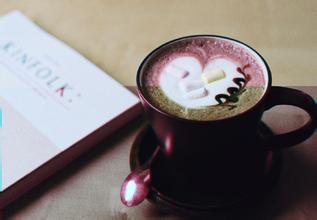European History on the Coffee Table
If the origin of coffee can be traced back to ancient African and Arab cultures, then the cafe people remember today is a pure European culture. more accurately, it is even a cradle and historical witness of modern European civilization.
When coffee flowed slowly and inexorably to Europe in the 17th century from its hometown of Ethiopia in Africa, through Yemen and the Ottoman Empire, which dominated the Arabian Peninsula and the Middle East, it was also the turbulent Europe that bid farewell to the last darkness of the Middle Ages and the beginning of modern social change and democracy.
Columbus's discovery of the New World, the upsurge of oriental adventure travel and maritime trade, as well as the unprecedented cultural conflicts and exchanges brought about by the Ottoman Expeditions to Europe, opened up the horizons of Europe.
The cafe is a product of pure European culture
In 1645, the first open street cafe in Europe was born in Venice, which had long belonged to the Habsburg dynasty of Austria. Paris and Vienna of France also followed, with relaxed and romantic French sentiment and elegant introspective Viennese literati temperament each with its own style, which became the forerunner of the two major trends of European cafes in the future.
Other emerging commercial ports Hamburg, Liverpool, Marseille, Antwerp, Lisbon. It is also the beachhead of the cafe. In just a few decades, the simple coffee shop with Turkish style founded by the Amenians and Arabs has quickly developed into an elegant and comfortable pure European coffee shop with crystal chandeliers. It is the social life center of the emerging "bourgeois", the political salon of ambitious Republicans, the "Finney University" of Enlightenment believers spreading radical ideas and culture, the club of free press sources, and the paradise of poets and artists meeting.
The life form of the upper class took to the streets
The cafe brought the closed salon life of the upper class to the streets. in many cities, it was the earliest public social place where citizens could meet freely. People read newspapers, debate, play cards, play billiards, watch satirical dramas, listen to music, watch and auction new-school paintings or newly invented machines, novelty and animals brought back from all over the world by ocean-going explorers.
By around 1700, there were nearly 3000 cafes in London alone, and many of the frenzied waves of the Republican revolution sweeping European metropolises began.
The widely influential political cafes in the era of the Great Revolution played the role of the "popular parliament" as the predecessor of democratic politics for quite a long time. Dickens, the founder of realistic novels, Balzac and Zola, writers famous for their critical style, avant-garde poet artists Kafka, Schoenberg, Picasso, Brecht Until a series of brilliant names, such as Freud, Adler, the master of psychoanalysis, and Wittgenstein, the founder of modern analytical philosophy, wrote the history of cultural development in modern Europe for hundreds of years on the regulars of different cafes.
Going to a cafe is a way of life.
As for the "cafe writers" in Paris and Vienna who were famous in the West at the beginning of the century, they spent their whole literary career here.
The cafe is the center of their life and literary base in the metropolis, and it is also the place where they can most inspire their creation. many of their masterpieces are not written in a closed study, but on a coffee table gathered by literary friends for years. They are almost always the last guests to put their chairs on the table when they close at midnight, sometimes flocking to the next cafe that closes later, only to return home slowly after the morning paper goes on sale the next day.
The famous "coffee shop writer" claims that his lifelong career is first as a regular customer of a coffee shop, followed by a writer, and that he goes to a coffee shop not for coffee, but as a way of existence. Such people are not limited to the literati circle, the regular customers of cafes come from the whole broad "leisure class", teaching and learning, according to each side, looking for fun and bosom friends in all kinds of cafes and smoke. "Gentleman Cafe", "Painters Cafe", "journalist Cafe", "Music Caf é", "College Student Cafe", "Congressman Cafe", "Workers Cafe", "Actors Cafe", "psychologist Cafe". They are varied, each with their own atmosphere and style, and even their artistic tastes are quite different.
Live or die with a fixed cafe.
No wonder the tasteful French have a traditional saying that it may be more difficult to get someone to change a cafe by the Seine than to change a religion! In an authentic cafe, regular customers not only never change their coffee shop easily, but also have a fixed time to come to the cafe and the habit of which coffee table to sit on. Of course, this loyal relationship is also reflected in the hospitable and tireless host, without greeting, the old waiter who is familiar with his frequent customers' temper and hobby will bring his favorite kind of coffee, accompanied by a plate of special snacks, and even bring his favorite newspapers and periodicals, needless to say thank you, which are taken for granted in an authentic cafe.
The relationship between regular guests and hospitality here is like loyal and tacit friends, occasionally penniless and will not be given the cold shoulder. From hospitality to other regular guests around, they will contribute generously, and you can spit out any grievances here. The demeanor of European cafes not only makes it a paradise for economically disadvantaged literati and scholars, but also makes many of them famous in literature, but also become experts who know the mysteries of coffee tasting.
For hundreds of years, kinds of coffee have emerged one after another. in traditional cafes, people never say a cup of coffee, but each has its own interesting name. There are often several pages of coffee lists with different ingredients, different flavors and dazzling tastes. Only an expert can enjoy it satisfactorily, while outsiders who don't know how to do it will inevitably scratch their scalps, look around and take the coffee in other people's cups as an example. In addition to milk coffee, the variety of coffee with wine and cocoa is even more varied. Making coffee is a complex art, and drinking coffee is also fastidious.

Important Notice :
前街咖啡 FrontStreet Coffee has moved to new addredd:
FrontStreet Coffee Address: 315,Donghua East Road,GuangZhou
Tel:020 38364473
- Prev

The rise of Taiwan's ancient pit coffee
Yunlin County is a large county with traditional agriculture, and most of the county residents also make a living by farming. Rice, sugar cane, sweet potato, peanut and garlic have always been the main crops cultivated by farmers in turn. For generations, they have relied on it to feed their families and reproduce their children. No one thought coffee would become a strange flower in this land, attracting foreign tourists or young and fashionable consumers.
- Next

Where on earth does coffee come from?
Around 900 AD, when a shepherd in the Cafa region of Ethiopia was grazing in the mountains, he found that the sheep were competing for a kind of red berry. After eating, the sheep were jubilant, and the shepherd was worried all night that his sheep had eaten some harmful food. Who knew the sheep were safe and sound the next day. This unexpected discovery prompted the shepherd to collect this wild fruit and boil juice to quench his thirst.
Related
- Beginners will see the "Coffee pull flower" guide!
- What is the difference between ice blog purified milk and ordinary milk coffee?
- Why is the Philippines the largest producer of crops in Liberia?
- For coffee extraction, should the fine powder be retained?
- How does extracted espresso fill pressed powder? How much strength does it take to press the powder?
- How to make jasmine cold extract coffee? Is the jasmine + latte good?
- Will this little toy really make the coffee taste better? How does Lily Drip affect coffee extraction?
- Will the action of slapping the filter cup also affect coffee extraction?
- What's the difference between powder-to-water ratio and powder-to-liquid ratio?
- What is the Ethiopian local species? What does it have to do with Heirloom native species?

